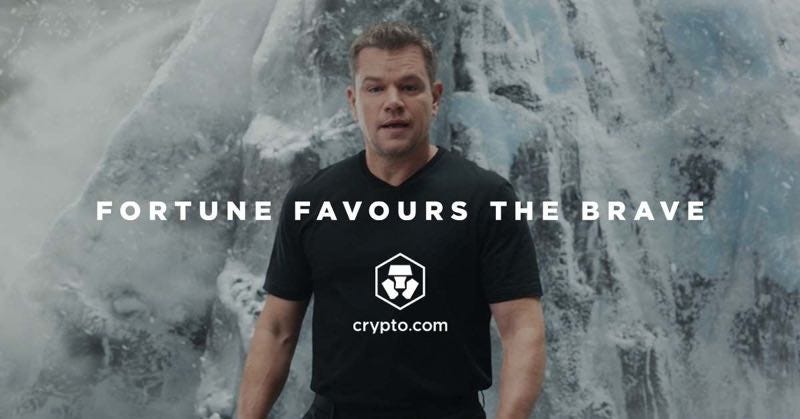Fortune favours the brave
Translated from a Latin proverb from around 200 BCE, as sayings go, "Fortune favours the brave" is one of the most popular in human history. The first recorded use was by Roman poets and playwrights while in the present day, armed forces throughout the world have it inscribed on their coats of arms and use it as their motto. This popular proverb has been used for over 2000 years which suggests that you're rewarded in life for being brave. But are you?
For a proverb to have stood the test of time for so long, it must offer some wisdom, and from my personal experience, I believe the answer is "yes", fortune does favour the brave. Being brave in the 21st century doesn't mean risking your life (it might have done in the Roman era), instead, being brave means going out of your comfort zone, and not being worried about failure or embarrassment.
From a historical perspective, this highlights how easy life has become, what we consider "brave" today really isn't. Counter-intuitively, as life has become safer and easier, new generations have felt less safe and risked less. With Gen Z being labelled as the most risk-averse. According to the social psychologist and author Jonathan Haidt, the cause of this is mollycoddling or "paranoid parenting" which he writes about in The Coddling of the American Mind.
[The Coddling of the American Mind by Jonathan Haidt & Greg Lukianoff]
Paranoid parenting is a powerful way to teach kids all three of the Great Untruths. We convince children that the world is full of danger; evil lurks in the shadows, on the streets, and in public parks and restrooms. Kids raised in this way are emotionally prepared to embrace the Untruth of Us Versus Them: ‘Life is a battle between good people and evil people’ – a worldview that makes them fear and suspect strangers. We teach children to monitor themselves for the degree to which they “feel unsafe” and then talk about how unsafe they feel. They may come to believe that feeling “unsafe”(the feeling of being uncomfortable or anxious) is a reliable sign that they are unsafe (the Untruth of Emotional Reasoning: ‘Always trust your feelings’). Finally, feeling these emotions is unpleasant; therefore, children may conclude, the feelings are dangerous in and of themselves – stress will harm them if it doesn’t kill them (the Untruth of Fragility: ‘What doesn’t kill you makes you weaker’).
With each generation consuming more and more media, it's fair to assume that it's not just "paranoid parenting" that's causing aversion to risk. The Internet has made the doom-monger news media omnipresent and with smartphone cameras in our pockets, all of us have become on-scene news correspondents. This means it's not just the negativity of the news media we have to contend with but social media too. Twitter and other social media platforms have become cesspools with uploaded viral footage of someone doing something outrageously shocking. All of which makes us believe we're surrounded by demons and that the world is a much scarier place than it actually is.
Crypto
There's a fine line between being brave and being stupid. Being brave or taking risks isn't advisable when it comes to your finances. I have a friend that’s incredibly risk tolerant when it comes to his finances. He'll plough money into horse racing, Ethereum, Dogecoin, you name it. Needless to say, his high-risk, high-reward financial strategy hasn't worked. Buying scratch cards or investing in high-risk assets isn't brave, it's stupid. Instead, being boring and taking the reliable path is statistically the best approach when it comes to money.
One celebrity that might not agree or more aptly he would but sold his soul is Matt Damon. His "fortune favours the brave campaign" implies that you'll be rewarded for being brave by investing in the likes of Dogecoin, NFTs or Bitcoin (all available on crypto.com). Needless to say, I'm sure Damon wasn't brave enough to be paid in Bitcoin for this commercial.
When were you last brave?
When you stop for a minute and reflect when was the last time you were brave? Maybe it was public speaking, leaving a failing relationship, or travelling solo. Whatever it was, did you feel like you were rewarded afterwards? And what things that make you nervous now have you been putting off? For me, it's the idea of driving on busy roads in London and motorways having recently passed my driving test (something I'd put off for years). Quitting my job is another one -- it's boring but it's easy and pays well which makes it a brave decision. Just like any big changes, I'm sure both of these "risks" will create opportunities and new life chapters (rewards) in my life.
The generations before us were the brave ones, not us, our lives are a cakewalk in comparison. They risked their lives by simply going to work; in a coal mine, on a farm or in a cotton mill, not to forget all those that went to war. Today, many of us are scared of change but it's the new things in life that make us feel alive. A good rule of thumb is that whenever an opportunity feels uncomfortable, it's an indication that it should be moved towards. Memories aren't forged when we play it safe or take the well-trodden path. And what's a life without memories? It's nothing. This is perfectly summarised by Michael Easter in The Comfort Crisis:
[The Comfort Crisis by Michael Easter]
New situations kill the mental clutter. In newness we’re forced into presence and focus. This is because we can’t anticipate what to expect and how to respond, breaking the trance that leads to life in fast forward. Newness can even slow down our sense of time. This explains why time seemed slower when we were kids. Everything was new then and we were constantly learning.
So there you have it, if you want to slow down time and "live longer" -- make it more challenging. We perceive new as risky and relatively speaking we are being brave when we move out of our comfort zone, but if we're not brave and don't take risks in life when all is said and done and we lay on our death bed it's safe to say that we'll have lived a life with little reward.




